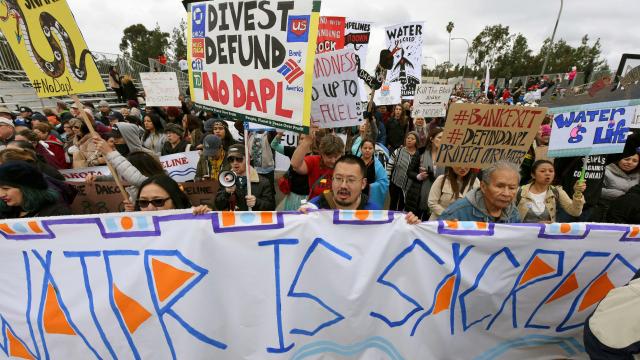Here is a simple truth: The world cannot build more fossil fuel infrastructure and have a habitable climate. Science bears this out, and a growing number of people around the world are putting their bodies on the line in the service of said science and habitable climate as well as protecting other natural resources.
This has put them in direct opposition to fossil fuel corporations, which rely on extracting ever-greater quantities of oil and gas and sending them to market. Years of funding climate denial helped preserve the business model a while longer.
Now, with society awakening to the alarming threats posed by climate change, fossil fuel companies have turned to a new tactic: pushing plug-and-play bills in U.S. state legislatures that make pipeline protests a severe crime.
The move to criminalise protests in America ” including those on public land and private land with consent as well as the act of organising remotely ” shows how desperate the fossil fuel industry is becoming.
Protests have helped raise awareness about the corrosive impacts pipelines have on the climate, land and water, and a growing number of Americans oppose major pipeline projects like the Keystone XL Pipeline.
Having lost that argument, the fossil fuel industry has turned to the option of last resort: trying to stifle free speech. And we’ll likely see the authoritarian slide continue as climate change makes the discussions around fossil fuel infrastructure even more acute.
A new Bloomberg News report shows that big names in fossil fuel extraction, shipping and refinement have all thrown their weight behind a slew of anti-protest bills specifically designed to protect fossil fuel infrastructure.
The extreme measure is the clearest sign yet the fossil fuel industry knows it has a losing hand and is making a desperate play to wring as many hydrocarbons out of the ground as possible.
The fossil fuel interests backing these protest laws are familiar ones. Koch Industries of Koch brothers infamy, Marathon Petroleum and Energy Transfer Partners (ETP) have backed the bills and all had a stake in the Dakota Access Pipeline. ETP also has a stake in the recently contested Bayou Bridge Pipeline in Louisiana.
Other companies involved in lobbying for laws that criminalise protesting near pipelines and other fossil fuel infrastructure, according to the documents reviewed by Bloomberg, include Magellan Midstream Partners, NextEra Energy, and Valero Energy, as well as the industry lobbying group American Fuel and Petrochemical Manufacturers (AFPM). Audio obtained by the Intercept underscores the role AFPM lobbyists have played in driving state-level legislation criminalising protests.
That has left state governments with a choice: side with people and their right to free speech or fossil fuel interests and extractive capitalism. In some states by and large led by Republican legislatures and governors, it has been latter.
The conservative American Legislative Exchange Council has even crafted a handy paint by the numbers bill for enterprising lawmakers who want to introduce anti-protest legislation that protects pipelines, petrochemical plants, oil refineries, and a host of other fossil fuel infrastructure.
North Dakota ” the site of the Dakota Access Pipeline protests”and Louisiana have both criminalised protesting near fossil fuel infrastructure (in Louisiana’s case, it was signed by a Democrat governor).
Six other U.S. states also have anti-fossil fuel protest laws on the books, according to a tracker maintained by the International Center for Not-for-Profit Law, while three other states are currently considering similar bills.
The U.S. Department of Transportation also has a legislative proposal it introduced in June that would result in stiffer fines for fossil fuel protesters. Here’s Bloomberg describing the new, draconian laws that are basically super-duper special trespassing laws:
“The new state laws vary, but generally create a new, more serious category of trespassing when it’s done near energy infrastructure and interferes with construction, carrying felony prison sentences of as much as five years and fines of as much as $US10,000 ($14,788).
In some cases, it can include activists who have permission from landowners to mount protests in the fields and trees near critical energy infrastructure. Some states have extended penalties to organisations found to have “˜conspired’ in the activity.”
Keep in mind that there are already trespassing laws in the U.S.. It’s also a federal crime to tamper with a pipeline, and fossil fuel infrastructure has been labelled “critical infrastructure” by the Department of Homeland Security, so it’s not like we need more laws protecting fossil fuel infrastructure. And yet.
Collectively, these bills are a new manifestation of the same old climate denial but more desperate and dangerous. The fossil fuel industry is in an argument with protesters it can’t win, so it’s trying to find willing lawmakers to help stifle descent ” and with it free speech rights and the entire conversation around climate change and the fossil fuel industry’s complicity in it.
The American Civil Liberties Union has fought against some of the protest laws themselves, arguing as much. The ACLU’s Iowa policy director, Daniel Zeno, told the Intercept that the anti-protest legislation “has the potential to chill environmental protest, punish public participation, and mischaracterize advocacy protected by the First Amendment.”
At the end of the day, this infrastructure of the fossil fuel industry may be critical for the economy of the past and quickly receding present. But winding down the fossil fuel industry, which still provides some 80 per cent of the world’s energy, is what’s truly critical to avert catastrophic climate change.
That means calls to stop constructing pipelines, refineries, and other “critical infrastructure” will only grow. And if the present is any indication, the industry is likely to resort to ever more dramatic tactics to silence dissent and continue to cash in even if it risks destabilising the entire planet.
